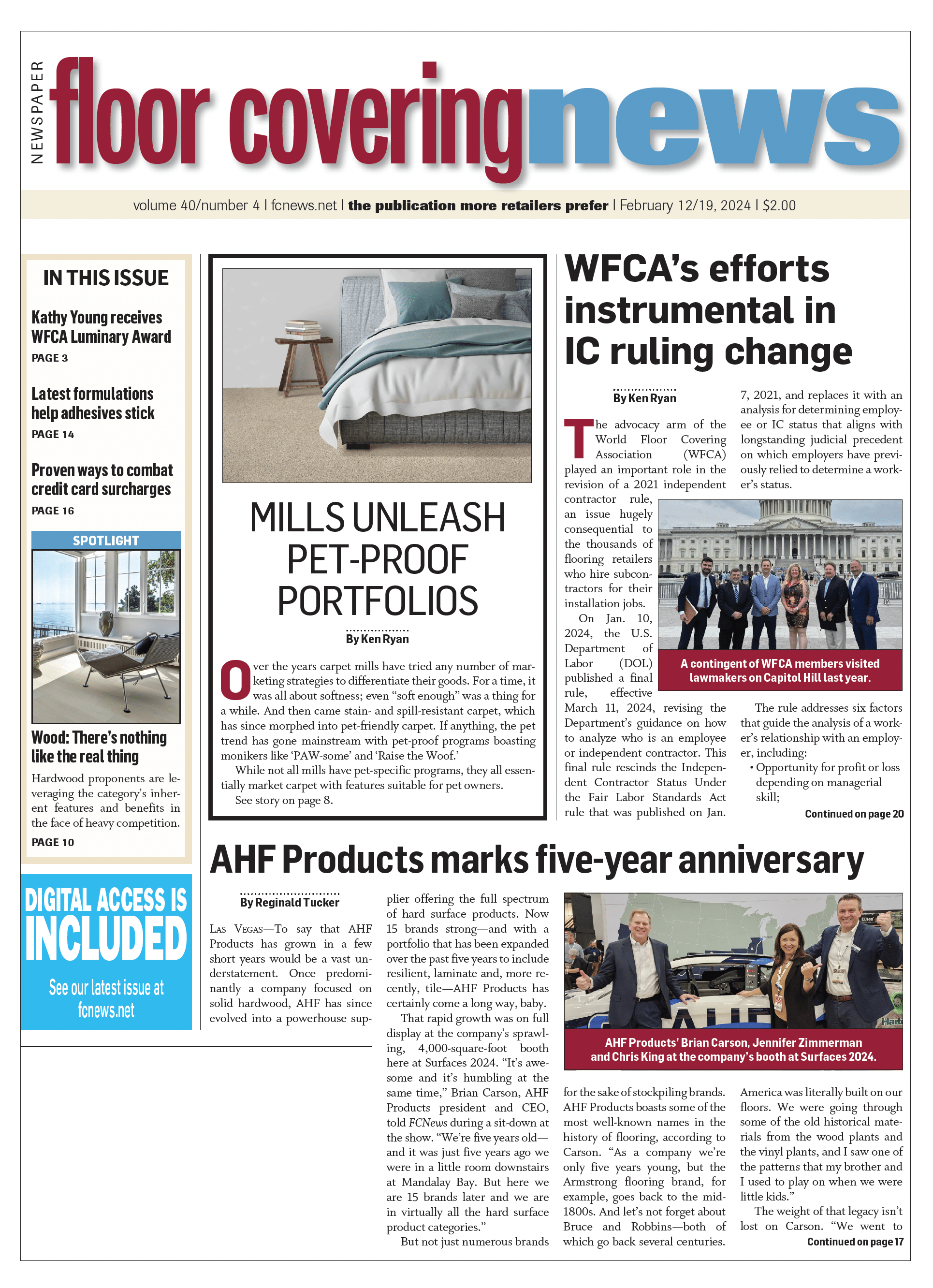 If you can’t beat ’em (the blood-thirsty credit card companies, that is), then you’ll need to learn how to pass along the fees they’re charging you onto your customers. That advice—while it seems counterintuitive—comes from experts who say it’s the best way to defray the high cost of financing.
If you can’t beat ’em (the blood-thirsty credit card companies, that is), then you’ll need to learn how to pass along the fees they’re charging you onto your customers. That advice—while it seems counterintuitive—comes from experts who say it’s the best way to defray the high cost of financing.
Just ask Eric Thompson, president of Satolli Carpet & Floor Covering, Warren, Ohio. He’s actually done the math. “For every ten thousand dollars in credit card charges, a business will pay around $250 in fees. If your small store sells $900,000 to a million dollars in sales and 30%-40% of those sales are paid with credit cards, the store’s owner will show a lower profit of more than $11,000—that’s $11,000 right out of the owner’s pocket at the end of the year.”
And that’s just the total for a smaller market owner operated store, according to Thompson. “The negative impact on a higher volume store or a small chain of stores could easily be 10x that amount or more,” he said. “So it makes sense to do everything possible to recoup those fees.”
In short, that means passing the buck—literally. For many dealers, that comes in the form of a surcharge. This essentially entails “passing on” to the customer a small fee to help cover the merchant’s costs for processing the payment. Credit card surcharges are now legal in most states, but some states have bans or restrictions that retailers must follow, so compliance is key.
Take the example involving Cristina Besore, vice president of operations, Atlas Floor Co., San Antonio, Texas, for example. At the beginning of January last year, she said her store began passing the cost of credit card processing to the customer. “With everything else rising, it’s either that or raise our margin—and we are reluctant to do that,” she explained.
Ditto for Kevin Columbro, president, Reliable Floor Coverings, Edmonds, Wash. Credit card swipe fees were costing him more than $45,000 a year. Back in late 2022, he had had enough. That is when he began passing those costs onto the customer. “We have signs around the store to let them know, and when we send a quote, we note that there’s a 3.5% processing fee for cards or, if they bring in a check, they would save on the fee.” (Offering a discount to customers who pay with cash or check is not, technically, a surcharge.)
The alternative to absorbing those charges, experts say, means cutting back in other areas of the business—namely perks or even benefits. And that’s something retailers are loathe to do. Thompson, who recently penned an article on the reasons why he could no longer continue absorbing those fees (see guest column on this page), draws parallels between what’s happening with consumer credit card fees and the healthcare industry.
As he explained: “A couple decades ago when healthcare insurance costs began unprecedented increases in premiums, employers faced similar choices and circumstances. They began cutting back on the benefits of an insurance package or stopped offering insurance coverage to employees altogether. Today, I often hear friends and colleagues complain about the high cost of their monthly insurance premiums through their employers. The credit card fees and the insurance premiums are a very similar problem. And neither is ever going away.”
More than one way around it
While implementing surcharges to consumers when they opt to use a credit card to purchase big-ticket items, it’s certainly not the only way to defray costs. Chad Ogden, president/owner of QFloors, a flooring-specific software company that has created its own integrated credit card processing and customer financing options to help flooring businesses navigate this territory, strongly recommends retailers negotiate their rates.
Floor covering retailers may not realize that, while some portions of the credit card fee are nonnegotiable, the processing fee is, according to Ogden. “When someone comes in to quote on a credit card, they’ll give a bid on what they’ll process your cards for,” he said. “Bigger stores get a better deal.”
Another recommendation is cost-plus pricing. There are generally two main ways credit card processing frees are quoted: flat-rate pricing and cost-plus pricing. Ogden warned that while flat-rate pricing may sound like the better deal, it’s often the more expensive choice. “With flat rates, the credit card company may charge, for example, 2.8% on every credit card sale you make,” he explained.
Cost-plus pricing, however, is dependent on the credit card being used. “The cost-plus rate will always come out less than the flat rate because you don’t have to guess what you’re going to get charged,” Ogden noted. “You’re getting charged based on what you’re using.”
If you must accept credit cards at the point of sale, experts also strongly recommend swiping as opposed to manually inputting the credit card number. Transaction pricing, or interchange rates, are based on a variety of factors such as merchant industry segment, type of card presented and if a transaction takes place in person or online. Swipe transactions come with more security, so they typically accrue lower processing costs. The more data you can capture during a credit card transaction (zip codes, etc.), the lower your processing fee is likely to be.
“Typically, the flooring dealer has no idea that it just cost him a lot of money simply because the sales rep didn’t type in a customer’s zip code,” Ogden noted.

